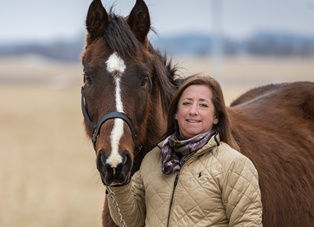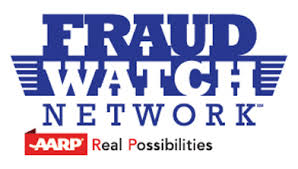AARP Hearing Center

By Larry Lehmer
Fraud is a huge problem, hitting 13 million Americans a year to the tune of $18 billion (that’s Billion, with a B). Every two seconds, someone’s identity is stolen. Older people are particularly vulnerable, even in Iowa.
Just ask Karla Sibert of Palo whose aging parents are at different stages of dementia. Karla’s dad has had Alzheimer’s disease for some time; her mom is “at the beginning of it.” Her parents’ diminished mental capacity led to the delivery of box after box of health supplements - thousands of pills - and credit card bills approaching $50,000 over a 20-month period before Karla and the Iowa Attorney General stepped in.
Karla lives within 10 miles of her parents’ home and, although she had hired a woman to look in on her parents twice a week, she wasn’t overly concerned with their well-being, certainly not their finances. “Mom would balance her checkbook to the penny and if she couldn’t find a penny, she’d stay up to all hours of the night until she found it,” Karla said. “She did mention at one point that she was receiving some stuff in the mail and she wasn’t sure what it was but I didn’t question it at the time.”
The questions would start flowing on April 4, 2014, when her mother was scheduled for a colonoscopy. “I took her phone because her friends were calling. I took a call from this company out of Las Vegas … this woman went on and on and on. She didn’t even give me a chance to say I wasn’t Mom. After she went on and on, I thought, ‘Well, I’m not telling her I’m not Mom.’ … I just told her I couldn’t talk right now.”
Curious about the call, Karla retrieved her mother’s credit cards from her purse and started calling each card company. “Oh, my God. That was one of the worse days.”
What Karla found was that a company located in Las Vegas, Nev., was billing her parents for thousands of dollars of health supplements like Garcinia Cambogia Extract, Hoodia, Liq-Eye, Marine Phytoplankton and Pure Raspberry Ketones.
Her mother told her she had about $500 in charges on one credit card; Karla found it was actually $21,500. “That $21,500 was charged in three days in the month of November. Her credit limit was $15,000 and they let it go over.”
A 28-year employee for the credit card company confided that she had never seen a fraud case that bad. “It took me 12 calls to get to that person to say that. It wasn’t easy, that’s for damn sure.”
In all, Karla found credit card bills totaling around $48,000. Upon checking her parents’ house, she discovered box after box of unnecessary pills and supplements. She confronted her mother about the supplements the next day.
“What were you thinking?” she asked.
“Well, I just wanted to feel better and this guy just kept calling, saying this and saying that,” her mother responded.
“How did you give him all these credit cards?” Karla asked.
“He’d call and he’d say, well, that one didn’t work,” her mother said, adding that she’d give him another one, which the company maxed out. Karla knew she had to get the credit card companies to credit back the charges and send the pills back.
Although Karla had power of attorney for her parents, she had never used it before. “It’s hard. You become the parent in a sense.” She checked with an attorney to verify her power of attorney, the same attorney who drafted her parents’ will. “I just said, ‘Oh my God what am I going to do on this?’ He just said, ‘Good luck.’”
Karla, a tenacious woman who founded an organization that rescues horses that need rescuing and ran for public office in Iowa, started creating her own good fortune.
Hearing about an Iowa Fraud Fighters event on May 1 at The Hotel at Kirkwood Center in Cedar Rapids, Karla called to reserve a spot, only to be told that the event was all booked up. “I just went anyway. I was desperate.”
There she met up with AARP Iowa communications director who connected her with a reporter from Cedar Rapids’ KCRG-TV, who was looking to interview someone attending the event who had a fraud story to tell. The reporter included a video of the trunk of Karla’s car, overflowing with the pills her parents had received.
At the event, she shared her story with the Iowa panel officials, including Attorney General Tom Miller and Al Perales, an investigator in the Iowa Attorney General’s Office, who said he’d look into her case. An investigation was begun, but the AG’s office struck a cautionary note. “They called me and said ‘we’ve never done anything like this. Don’t hold your hopes up that this is going to work,” Karla recalls.
“I was to the point where my parents needed to get into a nursing home, I needed to file bankruptcy and I needed to deny these charges on these credit cards,” Karla said. “I didn’t want to do that and my parents didn’t want me to file bankruptcy, but there’s no way that they could pay $50,000 for vitamins that were worthless.”
Negotiations with the credit card companies helped bring the balances down. The bank took about $19,000 off, acknowledging that it was elder abuse. One of the credit card companies wrote off $6,500 plus $3,800 interest.
“Little by little I got things down,” Karla said. “One financial institution had about $18,000, that they wouldn’t do anything with. They were not willing to work, they didn’t do anything for me.”
Iowa Attorney General Tom Miller then filed suit against the Las Vegas health supplement company after the investigation showed that the company had made several unsubstantiated claims about its products and was aware of the elderly Iowans’ “dementia” and “memory issues.”
Last fall, Polk County District Court Judge Robert J. Blink ruled in favor of the Attorney General, barring the company from marketing health or nutrition-related products to Iowans. Miller ordered the company to “pay back every dime to this Iowa couple as a condition of our settlement.”
Geoff Greenwood, communications director for Miller’s office, credits Karla for the satisfactory result. “She was a real bulldog in this case, which helped us achieve a great outcome,” Greenwood said.
Karla was also happy with the results, although “it never happens as quickly as you’d like it to.”
“The reason I was so determined with the attorney general was because I didn’t want other people to get burned like my parents did. I was so frustrated. How do they pick just one person out of Iowa, to do this to? I’m sure there are plenty of these going on all over the place. I just wanted it out there. I also didn’t want people to get where I was. It ruins your life. I work full time, I run a horse rescue for the state, I do a lot of things and it was like all I did for six months. Oh, my gosh. It was tough.”
Karla’s satisfaction is tempered with the knowledge that her parents probably will never know what she did for them.
“Dad definitely doesn’t have a clue. If he was of right mind, this never would have happened because he would have wondered why were these boxes coming to the house. My Mom has had so many health issues in the last year … there’s so much going on. I don’t know if she appreciates it.” Still, Karla encourages her fellow Iowans to be vigilant in caring for aging relatives and friends.
“Unless you live there, there’s no way for you to know what’s going on. You don’t realize that your parents are failing. I go to their doctor’s appointments all the time now because I know they’re not right. … I didn’t really understand what was going on until it happened. How can you prevent it? I guess just stay more involved in your parents’ lives and call them every day or talk to them, have some kind of contact with them.”
She also encourages people to attend public meetings like the Fraud Fighter event she attended in Cedar Rapids, which was co-sponsored by AARP Iowa. “There were a lot of people in that audience that stood up and told stories. One woman lost her farm. And they were elderly people. I thought I had problems and then I was listening to these other people and I thought, oh, my gosh. Yes, it’s definitely worth it. … It was booked. I don’t think I saw an empty seat there. It’s important.”
Karla’s case shows what can happen when a concerned caretaker takes notice of suspicious activity and follows through with the proper response. This is why AARP has created the AARP Fraud Watch Network initiative.
The AARP Fraud Watch Network is designed to give consumers access to information to help protect older Americans and people of all ages from identity theft, fraud and scams. It’s free and open to everyone – members, non-members and people of all ages – and it allows people who sign up access to watchdog alerts about active scams in their area, resources to help them spot and avoid con artists latest tricks, and local events in your area to help protect you and your family.
The AARP Fraud Watch Network contains valuable information about the way scammers think and how they target their victims. Researchers have analyzed hundreds of undercover fraud tapes and conducted many hours of interviews with convicted con artists and victims to determine how this crime happens. This research showed that they all use the same general strategies and tactics to swindle people.
The Network gives you the information you need to spot and avoid fraud so you can protect yourself and your family. You get:
• The latest scam alerts, delivered right to your inbox;
• A scam-tracking map featuring warnings from law enforcement and first-hand accounts of breaking scams from people in your state;
• The Con Artist’s Playbook — interviews with con artists who reveal how they steal your hard-earned money; and
• A phone number (1-877-908-3360) you can call to talk to trained volunteers free of charge.
Larry Lehmer is a freelance writer from Urbandale, Iowa, and an AARP Iowa volunteer
































































